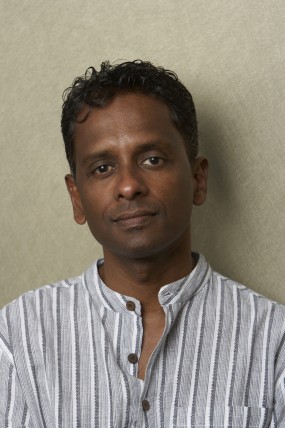Arjie, Selvadurai’s protagonist (and thinly-veiled autobiographical self), is apparently both foil to and member of the (economically) privileged male class and comes to embody the tensions in these post-postcolonial struggles. […] Arjie’s attempts at queer insurrection unwittingly mimic the repressive urges of (emerging) nation states. These states embrace an emboldening masculinity based on biological and essentialist notions of distinct gendered social roles—and in this simplified equation Arjie, unwittingly perhaps, acquiesces.
—Andrew Lesk (32-33)

Shyam Selvadurai. Photo by Kevin Kelly Photography. Used with permission from Random House of Canada.
Shyam Selvadurai’s novel Funny Boy presents the coming of age of Arjie, a young, gay, Tamil boy in Sri Lanka. Set against the backdrop of Sri Lankan social and cultural politics of the 1980s, the novel explores the barriers around love, marriage, gender expectations, and cultural tensions, specifically in the Sinhala and Tamil populations. The tension and change in Sri Lanka during the 1980s leading up to the events of Black July parallel the development of Arjie’s own tumultuous realization of his homosexual identity.
From 1983 to 2009, Sri Lanka was in a state of civil war between the reigning government, representing the majority Sinhala population, and the Liberation Tigers of Tamil Eelam (LTTE). The LTTE advocated for a separate Tamil state due to the perceived cultural marginalization of Tamil citizens in Sri Lanka. The 26-year civil war began in July 1983 with a series of massacres and riots targeting Tamil citizens. The inception of this violence is known as Black July.
Despite the clear sides drawn by historical overviews, Funny Boy suggests that the conflict was not as clearly divided in Sri Lankan communities, with many Sinhala and Tamil Sri Lankans living as neighbours and friends. In the same way, Dennis Austin observes in his political overview of modern Sri Lanka that all history is made up, but the history of Sri Lanka is more made up than most
(61).
Selvadurai uses the historical marginalization of the minority Tamil population in Sri Lanka as an analogue for Arjie’s position as a young gay man. During this time, and continuing today, homosexuality is illegal in Sri Lanka. As Arjie realizes and explores his homosexuality against the backdrop of Black July, his personal comfort in his sexuality emerges as he prepares to move to Canada, a jurisdiction that offers both asylum for persecuted Tamil refugees, and by the 1980s, provided legal protection for LGBTQ individuals.
Questions to Keep in Mind While Reading
- How does the setting—specifically the political climate of Sri Lanka in the 1980s—inform the text? How does Selvadurai’s narrative provide a parallel of Arjie’s journey to self-understanding with the social and political changes that surround him?
- Consider the gender expectations placed on Arjie as a child. How does he diverge from the representations of masculinity that he observes in his family?
- Much of the novel deals with cultural restrictions on love and marriage placed on members of his family. How do these restrictions affect Arjie’s burgeoning understanding of love? How do these barriers compare with Arjie’s own barriers to self-understanding?
Works Cited
- Austin, Dennis. Democracy and Violence in India and Sri Lanka. New York: Council on Foreign Relations Press for the Royal Institute of International Affairs, 1995. Print.
- Lesk, Andrew.
Ambivalence at the Site of Authority: Desire and Difference in Funny Boy.
Canadian Literature 190 (2006): 31–46. Print. (PDF) - Selvadurai, Shyam. Funny Boy: A Novel. San Diego: Harcourt Brace, 1997. Print.
- The International Institute for Strategic Studies.
Sri Lanka’s Civil War.
Strategic Comments 7.5 (2001): 1–2. Print.








 ©
©